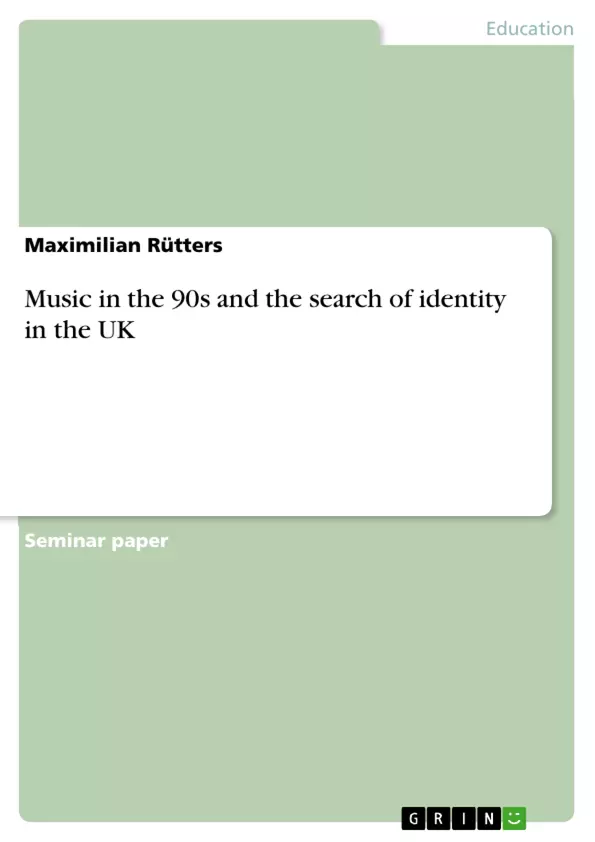People all over the world have been identifying with music for years. Music has a social quality that is across-the-board. But now only one nation is on focus. Every British decade had its own sound.
Looking at the 1960s, The Beatles and The Rolling Stones were dominating the music scene. Led Zeppelin and Black Sabbath invented Heavy Metal in the 1970s and also Glam Rock with representatives like Queen and David Bowie started during the 1970s. The 80s as the climax of the Punk Rock movement headed by the Sex Pistols and the upcoming Indie-Rock scene represented by The Cure.
Music, now and then, reflects its time, its history and all the changes that passes by.
The question of this term paper is, „Does one identity of the British excist? Or are there maybe several identities? Or none?“ And is music the key to find any answers?
Inhaltsverzeichnis (Table of Contents)
- Introduction
- Why the 90s?
- Theories
- National Identity
- Britpop
- Pop and Pop Bands
- Mixing everything: The Prodigy
- The climax of the 90s: Blur vs. Oasis - North vs. South
- Solution: Does music represents national identity?
Zielsetzung und Themenschwerpunkte (Objectives and Key Themes)
This term paper examines the role of music in shaping and reflecting British national identity during the 1990s. It explores whether a singular British identity exists or if multiple identities or none exist at all. It also analyzes how music genres, particularly those popular in the 1990s, contribute to understanding the perceptions and attitudes of British citizens.
- National Identity and Music: The relationship between music and the construction of national identity.
- The 1990s Music Scene: Examining the diverse and influential music genres of the decade.
- Cultural Influences: Exploring the impact of cultural trends and events on British identity.
- Media and Popular Culture: Analyzing the role of media and popular culture in shaping perceptions of British identity.
- Political Context: Investigating the political climate of the 1990s and its influence on music and identity.
Zusammenfassung der Kapitel (Chapter Summaries)
The introduction provides background information on the role of music in defining national identity and sets the stage for the study of the 1990s in Britain. It highlights the diverse music scene of the decade and poses the central question of whether a singular British identity exists.
The chapter on Theories delves into the concept of national identity and its connection to culture. It explores how media and shared cultural experiences contribute to the construction of a sense of national belonging.
The chapter on the climax of the 90s focuses on the rivalry between Blur and Oasis, two prominent bands representing different regions and musical styles. This chapter examines the cultural significance of this rivalry and its implications for British identity.
Schlüsselwörter (Keywords)
British national identity, music, 1990s, Britpop, popular culture, media, cultural influences, political context, Blur, Oasis, identity construction, cultural expression.
Frequently Asked Questions
How did music shape British identity in the 1990s?
Music, particularly Britpop, served as a cultural marker that reflected national pride and the social changes occurring in the UK during that decade.
What was the significance of the "Blur vs. Oasis" rivalry?
The rivalry represented a cultural divide between the North (Oasis) and the South (Blur) of England, highlighting regional identities within the broader British context.
Can one singular British identity be found through music?
The paper explores whether music reveals a unified national identity or a collection of diverse subcultural identities that coexist.
Who were the key musical representatives of British culture before the 90s?
The 60s were dominated by The Beatles and The Rolling Stones, the 70s by Led Zeppelin and Queen, and the 80s by Punk (Sex Pistols) and Indie (The Cure).
What role did The Prodigy play in 90s music?
The Prodigy is cited as an example of "mixing everything," representing the eclectic and genre-bending nature of the 90s British music scene.
- Quote paper
- Maximilian Rütters (Author), 2012, Music in the 90s and the search of identity in the UK, Munich, GRIN Verlag, https://www.grin.com/document/355728



